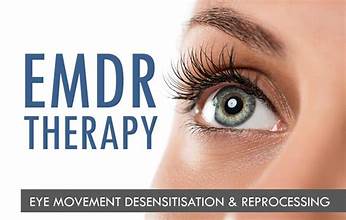Eye Movement Desensitisation and Reprocessing (EMDR) Therapy is an evidence-based, structured therapy approach that encourages the recipient to briefly focus on a trauma memory while simultaneously experiencing bilateral stimulation (typically eye movements). The goal is to help the brain reprocess the experience, reducing how the brain remembers the experience and the emotions attached to it. The concept of EMDR therapy is that individuals who have experienced distressing, traumatic events have those traumatic memories in the brain, unprocessed, which leads to various emotional and psychological challenges.
In addition, EMDR therapy assumes that the brain always tries to solve problems and make sense of a situation. Consequently, it focuses on asking questions and returning to the traumatic event to answer them.
During therapy, it’s expected that strong emotions, such as fear, anger, anxiety, and grief, will develop. Nonetheless, as the process continues, these emotions begin to subside. This is why people are encouraged to remain consistent in the therapy approach.
Who benefits from EMDR?
Eye Movement Desensitization and Reprocessing (EMDR) therapy is mostly focused on being effective for persons experiencing PTSD symptoms associated with a traumatic experience. This traumatic experience includes all forms of physical, psychological, emotional, and sexual traumatic experiences such as the loss of a loved one, accidents, bullying, emotional neglect, etc. It benefits persons with recent traumatic experiences as well as long-standing ‘unprocessed’ experiences for years.
While EMDR therapy is focused on the effects of trauma, research supports its use in managing other conditions such as anxiety, depression, chronic pain, Obsessive Compulsive Disorder (OCD), and different forms of addictions, among others.
Phases of EMDR
During an EMDR session, the therapist guides the recipient through a series of standardised procedures designed to stimulate bilateral brain activity. This bilateral stimulation can be achieved through various methods, with the most common being the side-to-side movement of the eyes. Other techniques include alternating sounds or taps, but eye movements are the most widely used
This usually takes place in these phases
- Phase 1: History-taking
- Phase 2: Preparing the client
- Phase 3: Assessing the target memory
- Phases 4-7: Processing the memory to adaptive resolution
- Phase 8: Evaluating treatment results
Number of Sessions Needed?
EMDR therapy sessions are recommended at 6 – 12 sessions. However, some persons have been reported to get benefits with fewer sessions while some may need more sessions. Nonetheless, you are encouraged to follow the guidance and recommendations of the therapist. EMDR is time-limited and aimed at healing the effects of a traumatic experience in the shortest time frame.
How is EMDR Different?
Unlike other treatments that focus on directly altering the emotions, thoughts, and responses resulting from traumatic experiences, EMDR therapy focuses directly on the memory and is intended to change the way the memory is stored in the brain, thus reducing and eliminating the problematic symptoms.
It’s important to note that you can assess online services anywhere, from the comfort of any device. However, physical therapy (face-to-face) is available in Lagos and Abuja, Nigeria.
Lagos – Lekki, Victoria Island, Ikota (Ajah Axis), Abraham Adesanya, Sangotedo, Surulere, Ikeja and Festac
Abuja – Maitama, Wuse





